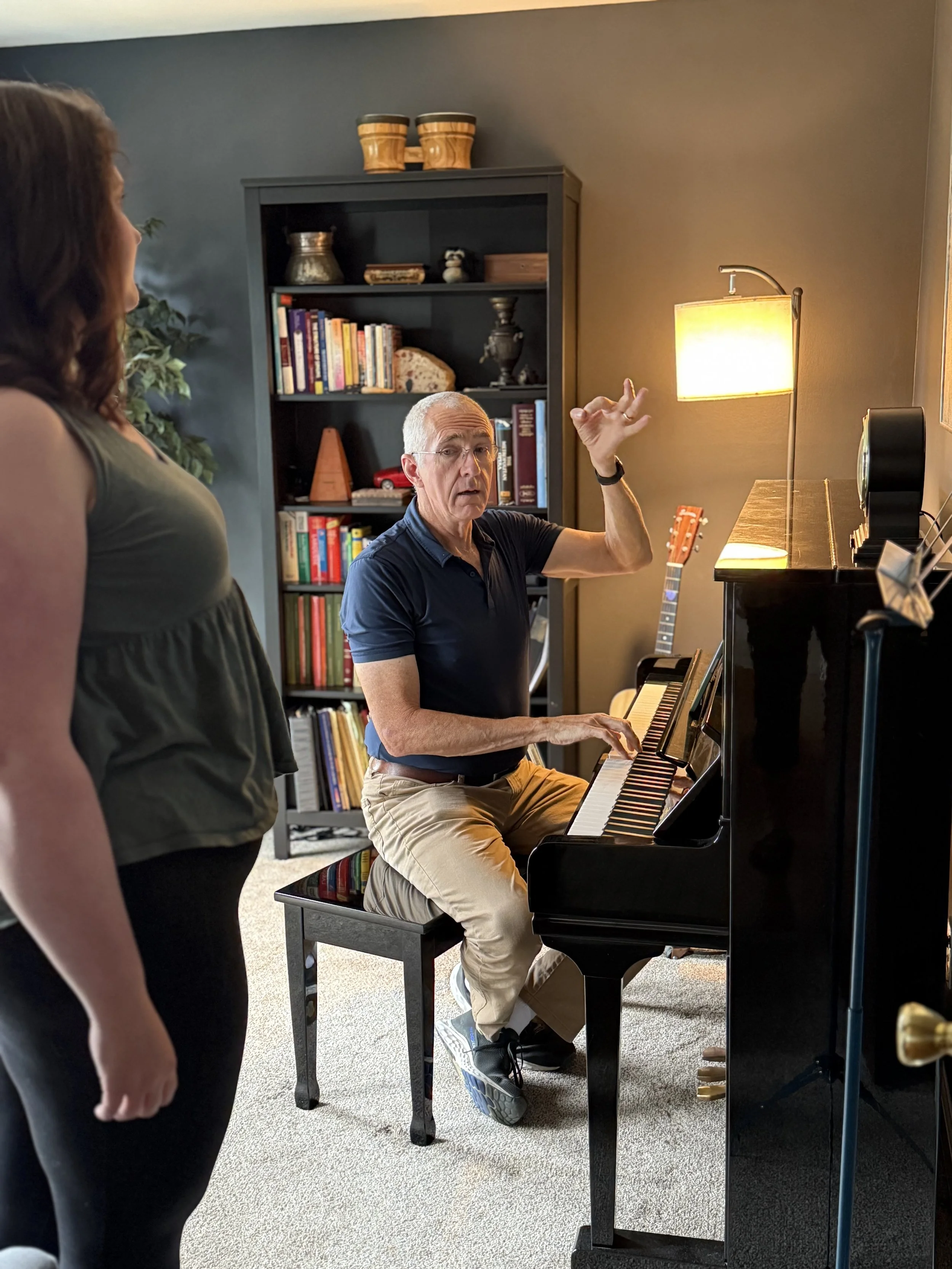What I teach
Ages and voice types
I teach all voice types from high to low, and all ages from 13 and up. Boys’ voices need to have changed before they begin voice lessons with me.
Style of music
I teach classical music (which includes art songs, oratorio, and opera, all suitable for Solo and Ensemble festivals) as well as musical theater. I also will occasionally work with my students on pop music, but the emphasis is on musical theater and classical music.
Education and career counseling
For high school students contemplating careers as performers or music educators, I offer counseling to help determine the best course of action. This may include which summer programs or elite youth choirs to audition for, and what additional training (piano, acting, dance, etc.) a student may need to have the best chance of being accepted into a good university program.
Different universities and individual degree programs often have different audition guidelines and students will need to be prepared individually for each school’s requirements. I have friends and colleagues on many music faculties across the country, as well as former students attending various schools, so I can suggest the best programs both in-state and nationally for students to apply to based on a number of factors including musical development, vocal potential, family economic situation, and academic achievement. Other factors like dance training and acting ability are also important for music theater students.
Students also need to be aware of what a career as a professional singer involves, including the various career paths and the lifestyle of a performer at the various stages of a musical career. I myself spent many years traveling as an opera singer and many of my friends are opera singers and musical theater performers, both on Broadway and touring.
Finally I write recommendation letters for my students and help prepare them mentally and musically for the increased expectation levels and workload of a university music student.
Often, adult students will also need advice on how best to pursue music at a local level including which organizations to audition for and how to prepare for an audition. I’m familiar with most of the better choirs and theater groups in the area and can direct adult students to a performing group that best suits their vocal ability, musicianship, and musical tastes.
Teaching philosophy
I believe that every voice is unique. Instead of trying to make a voice sound a certain way, I teach each student the physical actions of singing correctly based on the techniques perfected by the great teachers of the bel canto era, a period when the most beautiful singing was cultivated in order to serve the beautiful, highly melodic music composed during that time. What ends up coming out once a student begins to repeat the physical actions correctly is the student’s true voice. Once we begin to uncover that true voice, we then work on making the voice and the body that drives it more coordinated and stronger. This work includes teaching and using the principles of breath support including detailed explanations of how the muscles should interact to inhale, compress, and deliver the air to the vocal cords in the most efficient and controllable way.
At the same time as I help the students find and improve their unique sound, I begin to work on the interpretation of songs from many different angles. These include not only the text, but also the style from the time and place where the text and music were written and the shape of the musical line. I work with all of my students on simple Italian pronunciation and songs because singing Italian well leads to better singing in general. My more classically oriented students also work with me on correctly pronouncing all of the common languages of singing, which include Italian, German, French, and English. Eventually my most advanced high school students and adults work on pieces in all of these languages in preparation for auditions or performances.
Much of what I teach has been influenced by the two major teachers that I worked with early in my singing life. Dean Willis Patterson (no relation) was my teacher and mentor during my time studying at the University of Michigan. He set me up with a strong foundation in many different styles and gave me tremendous insight into the interpretation of art songs and opera. During his tenure he was a unique blend of scholar, educator, performer, conductor, and administrator. He is now retired from the university but remains an international expert on the songs of black American composers.
C. Dickson Titus (Dickson), now deceased, was my teacher in San Francisco during my years as a young professional and was a great expert on the teaching of the bel canto era. While he spoke seven languages fluently, he was purely Italian in his approach to teaching and all of his students received an incredibly thorough education in singing Italian correctly. This included developing an Italianate technique that could be adapted to singing in all of the other operatic languages. Dickson was also an expert on the styles of French art song and German lieder, both of which he studied in their countries of origin with expert teachers. His former students are some of the finest and most famous singers in the world of opera, including soprano Ruth Ann Swenson; bass baritones James Morris, Richard Bernstein, and John del Carlo; and mezzo soprano Susan Quittmeyer.
Both of these men had a profound influence on my singing and later on my teaching. Often when I’m teaching, it is one or the other of their distinctive voices that I hear coming from my heart and mouth to inspire another generation of young students.
